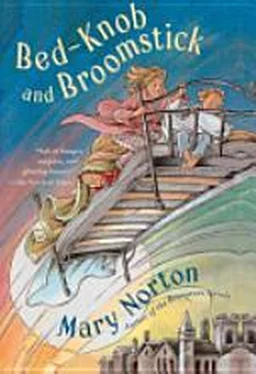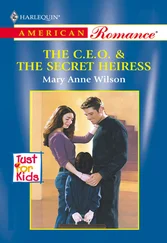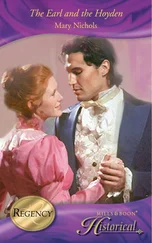Mary Norton - Bed-Knob and Broomstick
Здесь есть возможность читать онлайн «Mary Norton - Bed-Knob and Broomstick» весь текст электронной книги совершенно бесплатно (целиком полную версию без сокращений). В некоторых случаях можно слушать аудио, скачать через торрент в формате fb2 и присутствует краткое содержание. Жанр: Старинная литература, на английском языке. Описание произведения, (предисловие) а так же отзывы посетителей доступны на портале библиотеки ЛибКат.
- Название:Bed-Knob and Broomstick
- Автор:
- Жанр:
- Год:неизвестен
- ISBN:нет данных
- Рейтинг книги:5 / 5. Голосов: 1
-
Избранное:Добавить в избранное
- Отзывы:
-
Ваша оценка:
- 100
- 1
- 2
- 3
- 4
- 5
Bed-Knob and Broomstick: краткое содержание, описание и аннотация
Предлагаем к чтению аннотацию, описание, краткое содержание или предисловие (зависит от того, что написал сам автор книги «Bed-Knob and Broomstick»). Если вы не нашли необходимую информацию о книге — напишите в комментариях, мы постараемся отыскать её.
Bed-Knob and Broomstick — читать онлайн бесплатно полную книгу (весь текст) целиком
Ниже представлен текст книги, разбитый по страницам. Система сохранения места последней прочитанной страницы, позволяет с удобством читать онлайн бесплатно книгу «Bed-Knob and Broomstick», без необходимости каждый раз заново искать на чём Вы остановились. Поставьте закладку, и сможете в любой момент перейти на страницу, на которой закончили чтение.
Интервал:
Закладка:
He was a long time in the bath. The children tiptoed around the house in a state of nervous anxiety, as if a major operation was taking place upstairs. After a while, they heard him running the hot and cold taps and raising his voice, against the sound of the water, in a little Shake-sperian ditty, slightly off key.
"He's enjoying it," said Charles.
Emelius bathed, his soft mouse-colored hair falling carelessly across his brow, looked almost ten years younger. And there was an old-fashioned distinction about the Norfolk suit. It fitted him quite well; Miss Price's father, Carey realized, must have been as thin and angular as Miss Price. The buckled shoes, perhaps, were not quite right, but the over-all effect was pleasing; he looked rather romantic, or -as Charles put it-"like some kind of poet from Oxford." Miss Price examined him with critical eyes and, on the whole, seemed pleased. With comb and nail scissors, she lightly trimmed the hair behind his ears. "That's better," she said, as she brushed him down. Modestly proud, she seemed, as though she had.invented him. "Now let me see your nails. . . ." Emelius submitted humbly to being turned about-to having his tie knotted and his collar straightened; this was his homage to a master-craftswoman-one who would always know best.
They arranged to make tea a picnic meal and to take Emelius across the fields to Pepperinge Eye. It was with no small excitement that they started out on this expedition. Miss Price herself looked strangely moved as Emelius with sparkling eyes named each field or wood. There were few changes. Rush Field, Stummets, Cankerho, these had been the same in his day. Blowditch in Emelius's time had been called Bloodyditch, an echo of past battles, but Farr Wood was still Farr Wood, "and still," said Carey, who had walked there often, "as far." Emelius could not find his father's house in Pepperinge Eye. He thought it had stood on the site of the present vicarage. They all insisted upon going into the churchyard to see if, by any chance, Emelius had been buried there. But he wasn't-at least he couldn't find his own grave. He found, however, the grave of his aunt- Sarah Ann Hobday-and to his surprise, after scraping the lichen from the nearly defaced gravestone, he found that she had died on the twenty-seventh of August, 1666, the day-was it yesterday?-on which the children had appeared in his rooms. It was like getting a telegram.
"Oh, dear," said Miss Price, distressed, "I am so sorry. Perhaps we had better go home. ..." "Nay," said Emelius somberly. "Charon waits for all. Better to live well than to live long. I had not seen her since I was a child. . . ." He sighed. "Every light has its shadow." "And it's an ill wind-" began Charles eagerly.
Miss Price turned sharply. "What can you mean, Charles?" "Nothing," said Charles. He looked a little shamefaced and stooped to pick up a stone.
"He's thinking of the house," said Carey. "Couldn't we go and see it?" "Well, really, Carey-" began Miss Price. She seemed a little shocked.
"I mean, as we're so near? What's the good of going home? We'd only sit and mope. It might cheer him up," she added quickly. "I mean, it's his house now. . . ." "Would it yet be there?" asked Emelius.
Miss Price looked thoughtful. "I don't see why it shouldn't be." She turned to Emelius. "Do you know the way?" Yes, he knew the way all right-none better-by Tinker's Lane. But this they found had become a cart track and disappeared into a farm. "Trespassers will be prosecuted" said a notice on the gate, and a large black dog rushed out to bark at them.
"No matter," Emelius told them. Suddenly taking the lead, he led them back to the road, and, skirting the farm buildings, he took them through fields and spinneys to the base of the hill beyond. Miss Price became a little fussed and disheveled-she was not at her best climbing through hedges.
"Are you sure there isn't a bull?" she would ask, perched precariously on the upper rungs of a five-barred gate.
At last, they found the track again-a faint depression in the turfy grass. No more hedges; the hill swelled steeply above them. There were chalk and harebells and an occasional clump of beech trees. They followed the curve of the hill until at last the view widened beneath them and a sweet breeze stole their breath. Carey found a fossil; Miss Price mislaid a glove.
While they were searching, Emelius went ahead; turning a sudden corner, he seemed to disappear. When at last they came upon him, he was standing in a hollow, knee-deep in brambles. Among the brambles, there were stones and rubble. It might well have been the ruin of a house, Carey thought- looking about her-awash with elder bushes and trailing honeysuckle. Tears of disappointment came to her eyes. "Was it really here? " she asked, hoping he might be mistaken.
"Indeed, yes," Emelius assured her. He seemed elated rather than depressed-as though this was proof of his having skipped the centuries. He took Miss Price's hand and helped her down-quite excited he had become, almost boyish-and left her marooned on a piece of coping while gingerly he jumped from stone to stone, showing the general layout of the rooms. "Here was the parlor, here the dairy. This," he explained as he jumped down into a long hollow, "was the sunken garden where my aunt grew sweet herbs." He kicked the sandy rubble from some flat stones. "And here the cellar steps." He showed them where the apple orchard had been and the barn. "It was a comely, neat house," he repeated proudly. "And none to inherit it save I." When they reached the main road, a strange incident occurred. Emelius disappeared. One moment he was walking just behind them, and the next he was nowhere to be seen. Miss Price stopped Dr. Lamond in his old Ford and asked him if he had seen, along the road, a young man of Emelius's description.
"Yes," said the doctor. "As I turned the corner, he was close behind you; then he made a dart for that field." They found Emelius behind the hedge, white and shaking. It was the car that had unnerved him. His panic, in the face of such a monster, had left no place for courtesy. It was some time before Miss Price could calm him. When the mail van passed them later, Emelius stood his ground, but the sweat broke on his brow, and he quivered like a horse about to shy. He did not speak again until they reached home.
6 MAGIC IN MODERATION Breaking Emelius into twentieth-century life was not easy, but Miss Price had great patience. He learned to clean his own shoes and to pass the bread and butter at tea. He became more modern in his speech, and once was heard to say O.K. They had no sooner got him used to cars when he saw a jeep, and all their good work was undone. Airplanes he marveled at, but they did not come close enough to frighten him. But daily, as he learned more of the state of the world, modern inventions and the march of "progress," he clung closer to Miss Price as the one unassailable force in the midst of nightmarish havoc.
On warm evenings, after the children were in bed, he would be with Miss Price in the garden, stripping damsons with a rake (for bottling), and they would talk about magic. Carey could hear them through her window, their voices rising and falling in restrained but earnest argument as the damsons pattered into the basket and the sun sank low behind the trees. "I never scrape the scales from an adder," she once heard Miss Price say earnestly. "It takes force from any spell except those in which hemlock is combined with fennel. The only time I ever scrape the scales from an adder is in spells against St. Vitus's dance; then for some reason, it gives better results. . . ." Sometimes, when Emelius had been speaking, Miss Price would exclaim rather scornfully: "Well, if you want to go back to the wax image and pin school-" and Carey always wondered what the wax image and pin school was, and why Emelius, having graduated, should want to go back there.
Читать дальшеИнтервал:
Закладка:
Похожие книги на «Bed-Knob and Broomstick»
Представляем Вашему вниманию похожие книги на «Bed-Knob and Broomstick» списком для выбора. Мы отобрали схожую по названию и смыслу литературу в надежде предоставить читателям больше вариантов отыскать новые, интересные, ещё непрочитанные произведения.
Обсуждение, отзывы о книге «Bed-Knob and Broomstick» и просто собственные мнения читателей. Оставьте ваши комментарии, напишите, что Вы думаете о произведении, его смысле или главных героях. Укажите что конкретно понравилось, а что нет, и почему Вы так считаете.












